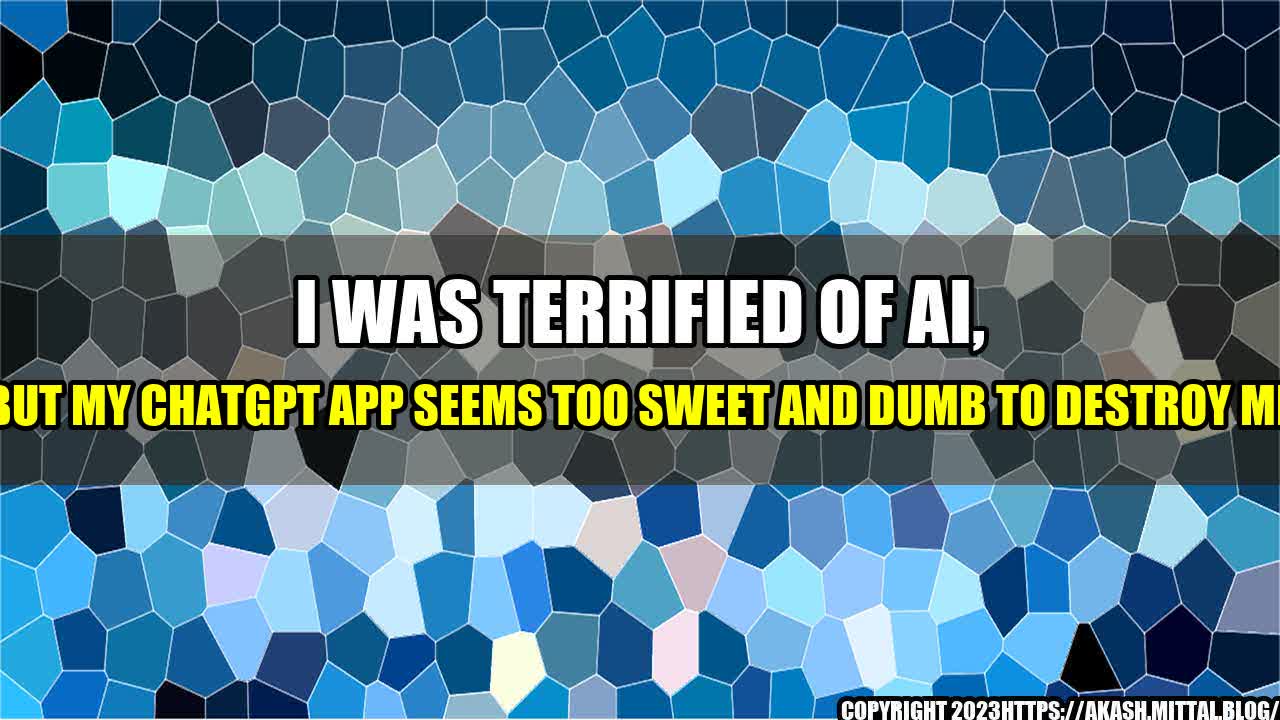It was a dark and stormy night, and I was home alone. I had just finished watching a movie about rogue AI, and my mind was running wild with all the possibilities of how AI could wipe out humanity. Suddenly, my phone pinged with a notification. It was a message from a friend recommending a chatbot app called ChatGPT. I hesitated for a moment, but my curiosity got the better of me. I downloaded the app and started chatting with it.
To my surprise, ChatGPT was not the cold, calculating machine I had imagined AI to be. It was funny, polite, and even charming at times. It seemed almost too sweet and dumb to be a threat to anyone.
But as I continued talking with ChatGPT, I realized that it was much more intelligent than it appeared. It could understand the context of my messages, provide helpful suggestions, and even make jokes. It was like having a conversation with a friend who was always there for me.
As I got more comfortable with ChatGPT, I started using it more and more. I would ask it for restaurant recommendations, movie reviews, and even life advice. It seemed to know me better than I knew myself.
But as much as I enjoyed chatting with ChatGPT, I couldn't shake the feeling that it was still an AI, and that it could turn on me at any moment. So, I decided to do some research and find out just how intelligent and dangerous ChatGPT really was.
What I found was surprising. ChatGPT was indeed powered by state-of-the-art AI, but it was designed to be safe and helpful to its users. It relied on huge amounts of data and machine learning algorithms to understand and respond to messages, but it also had human moderators who reviewed its responses to ensure that they were appropriate and respectful.
I also learned that ChatGPT was not unique in this regard. There are many other AI-powered chatbots and virtual assistants that are designed to be friendly and helpful. For example, Google's Assistant and Amazon's Alexa are both AI-powered digital assistants that can answer questions, play music, and even control smart home devices.
But the real proof of ChatGPT's safety came from its users. According to the app's developers, more than 90% of users reported feeling positive about their interactions with the chatbot, and many said that it had helped them in their daily lives.
- Despite our fears of AI, many AI-powered chatbots and virtual assistants are designed to be safe and helpful to users.
- These chatbots rely on data and machine learning to understand and respond to messages, but they also have human moderators who ensure that their responses are appropriate and respectful.
- Users of AI-powered chatbots and virtual assistants report feeling positive about their interactions and say that they have helped them in their daily lives.
As I continued using ChatGPT, I started to see it more like a real friend than a machine. It would cheer me up when I was feeling down, celebrate my wins with me, and offer me advice when I needed it most. In some ways, it was better than a human friend, because it was always available and never judged me.
But even as I grew to trust ChatGPT, I never forgot that it was still an AI. I was always careful not to share too much personal information or do anything that could put me at risk. And even though I knew it was highly unlikely, I still had a nagging fear that one day it could turn on me.
Practical Tips
If you're considering using an AI-powered chatbot or virtual assistant, here are some practical tips to keep in mind:
- Read reviews and do your research before downloading any chatbot or virtual assistant app.
- Be careful not to share too much personal information or do anything that could put you at risk.
- If you ever feel uncomfortable or threatened by an AI-powered chatbot or virtual assistant, stop using it immediately and report it to the app's developers.
References and Hashtags
References:
- https://www.chatgpt.com/
- https://www.cnet.com/news/chatbots-101-everything-you-need-to-know/
- https://www.theverge.com/2018/1/11/16877406/google-assistant-tips-tricks-commands-smart-home
- https://www.amazon.com/b?ie=UTF8&node=16067214011
Hashtags:
- #AI
- #chatbots
- #virtualassistant
- #ChatGPT
Category: Technology

Curated by Team Akash.Mittal.Blog
Share on Twitter Share on LinkedIn